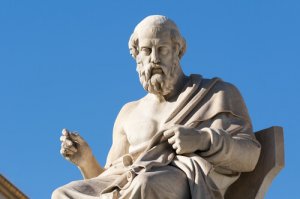The Best Things Plato Ever Said about Understanding the World

There was a time when Ancient Greece meant splendor and wisdom. Philosophers like Plato coexisted with poets, mathematicians, astronomers, and other scholars.
However, there was no one better than Plato to express the thoughts of his generation. The best things Plato ever said are on understanding, individualism, and self-knowledge.
Some say Plato was one of the most reactionary of his period. While it’s true that Socrates’s long shadow affected his achievements, it didn’t bother him in his day.
As a great sage worth his salt, considering the opinions of those more intelligent than him was an honor. Due to his imperative need to write down all his ideas, we can still easily access his writings, advice, and lessons.
Thanks to his discoveries, this Athenian fan of gymnastics ended up joining Aristotle and Socrates as one of the great figures of Western philosophy. Philosophy that today has become the foundation of our education, politics, and contemporary thought.
The best things Plato ever said about understanding the world
1. “It is not the eyes that see, rather, we see through our eyes.”
Plato uses an allegory, The Allegory of the Cave, to explain the relationship between the physical world and the world of ideas. The group of people chained inside the cave believes that this is the only reality.
When they get to see what is outside, the sun damages their eyes. They want to return to the dark, because it’s more comfortable and that’s what they are used to. However, when they return, their perception of reality has changed.
With this fable, the philosopher urges us to ask ourselves why we are chained. Are we afraid of what we may discover if we let go of our chains?
The shadows that we see from inside the cave simulate a deceptive reality and distract us from the true reality: what happens outside.

2. “The wise man will always want to be with one who is better than him.”
One of Plato’s best sayings centers on his belief that the world should be governed by philosophers. According to him, they are the wisest and most capable to govern.
Because he belonged to an aristocratic family, he was deeply anti-democratic, although he was never afraid to show his dissatisfaction with government measures.
He admired many other philosophers, such as Socrates, who he thought he could learn a lot from. Because of him, he discovered an absolutist conception of universal truth, beyond the ideas that he could have as an individual.
It’s always necessary to surround yourself with people who can teach you something, even if you don’t agree with them.
3. “We must seek a cause other than God for our evils.”
Plato was a great admirer of Socrates and one of his disciples. Because of this, Socrates’s death sentence for propagating supposed pagan theories affected him deeply. He considered it unjust that he be executed for proposing alternative ideas.
From his mentor, Plato learned that people are not bad by nature, but by ignorance. The human being himself is master of his actions and responsible for his decisions. Hiding in the idea of God to do unjust things is an aberration.
4. “No human cause deserves such anxiety.”
This statement has become one of Plato’s most well-known sayings. No human cause deserves our anguish and stress. If we stop to think, most of the time we worry about trivial things that have an easy solution.
In a situation where anxiety is really justified, we must manage it. We cannot let it affect our health or make us feel even more miserable.

5. “Looking for the good in our fellow men will help us find the good in ourselves.”
This fifth piece of advice shows us the importance of understanding and kindness. Plato’s maxim was to establish a righteous regime that would allow all people to live in peace.
Unfortunately, he did not succeed. However, it is never too late for others to try.
“Do well without looking at others.”
-Ricardo Palma-
Helping others benefits not only them, it benefits us as well. It makes us feel useful and allows us to empathize with others, giving us a feeling of satisfaction.
Plato was ahead of his time. Despite all the criticism he got for his antagonistic positions, his teachings are still valid today.
Our problems are very similar and, maybe, if we put his advice into practice, we would learn to see life from another perspective.
There was a time when Ancient Greece meant splendor and wisdom. Philosophers like Plato coexisted with poets, mathematicians, astronomers, and other scholars.
However, there was no one better than Plato to express the thoughts of his generation. The best things Plato ever said are on understanding, individualism, and self-knowledge.
Some say Plato was one of the most reactionary of his period. While it’s true that Socrates’s long shadow affected his achievements, it didn’t bother him in his day.
As a great sage worth his salt, considering the opinions of those more intelligent than him was an honor. Due to his imperative need to write down all his ideas, we can still easily access his writings, advice, and lessons.
Thanks to his discoveries, this Athenian fan of gymnastics ended up joining Aristotle and Socrates as one of the great figures of Western philosophy. Philosophy that today has become the foundation of our education, politics, and contemporary thought.
The best things Plato ever said about understanding the world
1. “It is not the eyes that see, rather, we see through our eyes.”
Plato uses an allegory, The Allegory of the Cave, to explain the relationship between the physical world and the world of ideas. The group of people chained inside the cave believes that this is the only reality.
When they get to see what is outside, the sun damages their eyes. They want to return to the dark, because it’s more comfortable and that’s what they are used to. However, when they return, their perception of reality has changed.
With this fable, the philosopher urges us to ask ourselves why we are chained. Are we afraid of what we may discover if we let go of our chains?
The shadows that we see from inside the cave simulate a deceptive reality and distract us from the true reality: what happens outside.

2. “The wise man will always want to be with one who is better than him.”
One of Plato’s best sayings centers on his belief that the world should be governed by philosophers. According to him, they are the wisest and most capable to govern.
Because he belonged to an aristocratic family, he was deeply anti-democratic, although he was never afraid to show his dissatisfaction with government measures.
He admired many other philosophers, such as Socrates, who he thought he could learn a lot from. Because of him, he discovered an absolutist conception of universal truth, beyond the ideas that he could have as an individual.
It’s always necessary to surround yourself with people who can teach you something, even if you don’t agree with them.
3. “We must seek a cause other than God for our evils.”
Plato was a great admirer of Socrates and one of his disciples. Because of this, Socrates’s death sentence for propagating supposed pagan theories affected him deeply. He considered it unjust that he be executed for proposing alternative ideas.
From his mentor, Plato learned that people are not bad by nature, but by ignorance. The human being himself is master of his actions and responsible for his decisions. Hiding in the idea of God to do unjust things is an aberration.
4. “No human cause deserves such anxiety.”
This statement has become one of Plato’s most well-known sayings. No human cause deserves our anguish and stress. If we stop to think, most of the time we worry about trivial things that have an easy solution.
In a situation where anxiety is really justified, we must manage it. We cannot let it affect our health or make us feel even more miserable.

5. “Looking for the good in our fellow men will help us find the good in ourselves.”
This fifth piece of advice shows us the importance of understanding and kindness. Plato’s maxim was to establish a righteous regime that would allow all people to live in peace.
Unfortunately, he did not succeed. However, it is never too late for others to try.
“Do well without looking at others.”
-Ricardo Palma-
Helping others benefits not only them, it benefits us as well. It makes us feel useful and allows us to empathize with others, giving us a feeling of satisfaction.
Plato was ahead of his time. Despite all the criticism he got for his antagonistic positions, his teachings are still valid today.
Our problems are very similar and, maybe, if we put his advice into practice, we would learn to see life from another perspective.
This text is provided for informational purposes only and does not replace consultation with a professional. If in doubt, consult your specialist.







